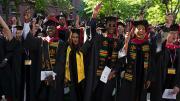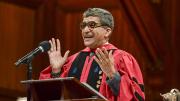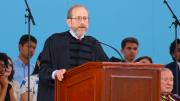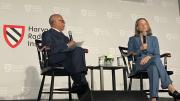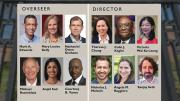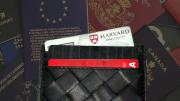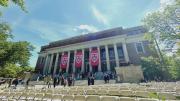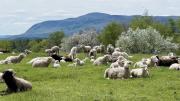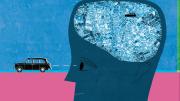Following Thursday’s in-person, new-look Commencement for the class of 2022, the University this morning put on a unique, second “Commencement Celebration” for a huge crowd of 2020 and 2021 graduates (deprived of normal graduations during the COVID-19 pandemic) and their families and friends. It was the centerpiece of a weekend of school and House ceremonies that brings a deferred, emotional closure to the graduates’ Harvard experiences.
Beyond the understandable focus on the graduates, gathered at last in Tercentenary Theatre, in the presence of honored guests and special speaker Merrick Garland ’74, J.D. ’77, U.S. Attorney General (appearing at a fraught time for American democracy), the ceremony itself had a stirring centerpiece. A tribute to those who served Harvard and humanity during the pandemic, spoken by members of the classes of 2020 and 2021, accompanied by images and music, was punctuated with a refrain of “We salute you, and we thank you”—repeated until morphing at the end into two powerful, surprise expressions of love for parents and congratulations to the students themselves (see below). It bids fair to become the iconic moment in the community’s collective memory of the terrifying, isolating, and disorienting months from March 2020—and of the strengths that enabled people at Harvard, and everywhere, to persevere.
Planning an Unprecedented Celebration
When President Lawrence S. Bacow promised members of the class of 2020, dispersed from campus as of March 15, that they would come together again for a proper Commencement, and reiterated that pledge to their successors the following year, it seemed both the right thing to do, and a rash idea. When could such a ceremony be held, and how? What would it mean to clone a “commencement” for people who had already received their degrees, and so would reconvene not as students but as alumni? Who would want to come back?
As it turns out, presidents are paid to have good antennae, and this one—a consummate people person—has an excellent set. Bacow judged acutely how much students and families cared about having their big moment at the end of their College or graduate- and professional-school labors. And for once in this unending pandemic (he and his wife, Adele Fleet Bacow, contracted COVID-19 early on, and both had milder repeat infections this spring, after a trip to London; Commencement speaker Jacinda Ardern, prime minister of New Zealand, tested positive and had to isolate earlier this month), the timing was right.
Although new variants of the coronavirus have surged across Massachusetts in recent weeks, vaccination, therapeutics, and immunity have reduced the severity of the infection. (Giang T. Nguyen, executive director of Harvard University Health Services, did send yet another community email on May 23 with the subject line, “COVID-19 Considerations at Commencement,” asking one and all to test daily, to stay away from events if testing positive or exhibiting any symptoms, and to mask indoors. The virus endures.) People are raring to travel and connect again, and registration for today’s ceremonies if anything surged even more vigorously than the pathogen. As of May 18, some 9,123 members of the two classes had signed up: more than the crowd on whom degrees were conferred in person this past Thursday, and more than half the total cohort eligible to attend. They were led by 2,670 College graduates—nearly 90 percent of the class members, Dean Rakesh Khurana told the Harvard Crimson; 1,225 from the extension programs; and large cohorts from the big professional schools: business, education, law, and government. Those who required financial aid to attend received it. A massive effort to arrange travel, find accommodations on campus (easier with the students out of Houses after Commencement, and the reunioners not yet arrived) and off, and rally Harvard’s troops for a suitable way to confirm degrees that had previously been conferred, came together at the scheduled hour just three days after the regular Commencement extravaganza. Seeing the Commencement office, alumni organization, president’s staff, and schools pull it off, one is reminded that presidents, deans, professors, advisers, and staff members have chosen lives in academia, and they thrill to students’ and families’ joy at being recognized for achieving their educational goals. Kismet all around.
The Events of the Day
The program for the day largely followed that used at regular Commencements, like the 371st, held this past Thursday, as regularly scheduled. Given the condensed weekend of House and school gatherings and compressed travel schedules, the schedule called for an early academic procession, and for the ceremonies to begin at 8:00 a.m. (versus 9:45 at Thursday’s shebang—student hours for those graduates-in-waiting, real-world hours for the already-alumni of the classes of 2020 and 2021). In fact, things got under way at 8:12 a.m, with Provost Alan M. Garber, emcee, and Middlesex County sheriff Peter M. Koutoujian, M.P.A. ’03, calling the meeting to order (the latter, as always, as shatteringly loud as possible).
“The Star-Spangled Banner” featured soloist Nivi Ravi ’21, a member of the choral program and a much-acclaimed undergraduate singer—the first of several student parts in the proceedings. A joint concentrator in neuroscience and music at the College, the Glenview, Illinois native spent her senior year coordinating a completely remote production of Handel’s “Messiah” as president of the Harvard-Radcliffe Collegium Musicum. Since graduation, she has continued neuroscience research and toured as a cast member of Iphigenia, a new opera created by Grammy-winning saxophonist Wayne Shorter and professor of the practice of music esperanza spalding (who does not capitalize her name). Ravi’s graceful, operatic soprano voice rang in the ceremony with goosebumps.
The opening prayer was delivered by the chaplain of the day, the Rev. Alice Cabotaje, director of spiritual care and clinical pastoral education at Massachusetts General Hospital—one of the centers for COVID-19 acute care and research throughout the pandemic. She has served as a minister in the Metropolitan Community Church, is a credentialed Dharma teacher in the Rinzai Zen Buddhist tradition, and directed spiritual care at MGH through the pandemic, a time of unprecedented fear, loss, and grinding stress. Her prayer thanked the God of each listener’s understanding, and also honored the Massachusett tribe, upon whose ancestral land Harvard was built. Her message also embraced, not only the graduates’ successes, but their brokenness. She invited them to “welcome all aspects of themselves–the good and bad,” saying that “it’s through the cracks in our lives that light can seep through.”
The Commencement Choir and University Band then performed the Presidential Fanfare, and President Bacow welcomed those present. Looking out at the crowd of “happy families as far as the eye can see,” he told the graduates, “I’ve been waiting a long time to say these words, so I will ask you to listen very, very carefully–congratulations!” He warmly acknowledged the class members who were unable to attend in-person today and were participating virtually instead. Their fellow classmates joined in the welcome, waving their crimson flags at the livestream camera and cheering on the virtual attendees. He joked that while the graduates are sure to encounter challenges in life, they will no longer be challenged by Harvard. All of the long “p-sets,” essays, and theses “are in the rearview.” Now comes “veritas ad infinitum,” or the lifelong reciprocal membership alumni have with the Harvard community. He concluded by asking graduates to “Take what you’ve learned here and leave this imperfect world better than the one you inherited.”
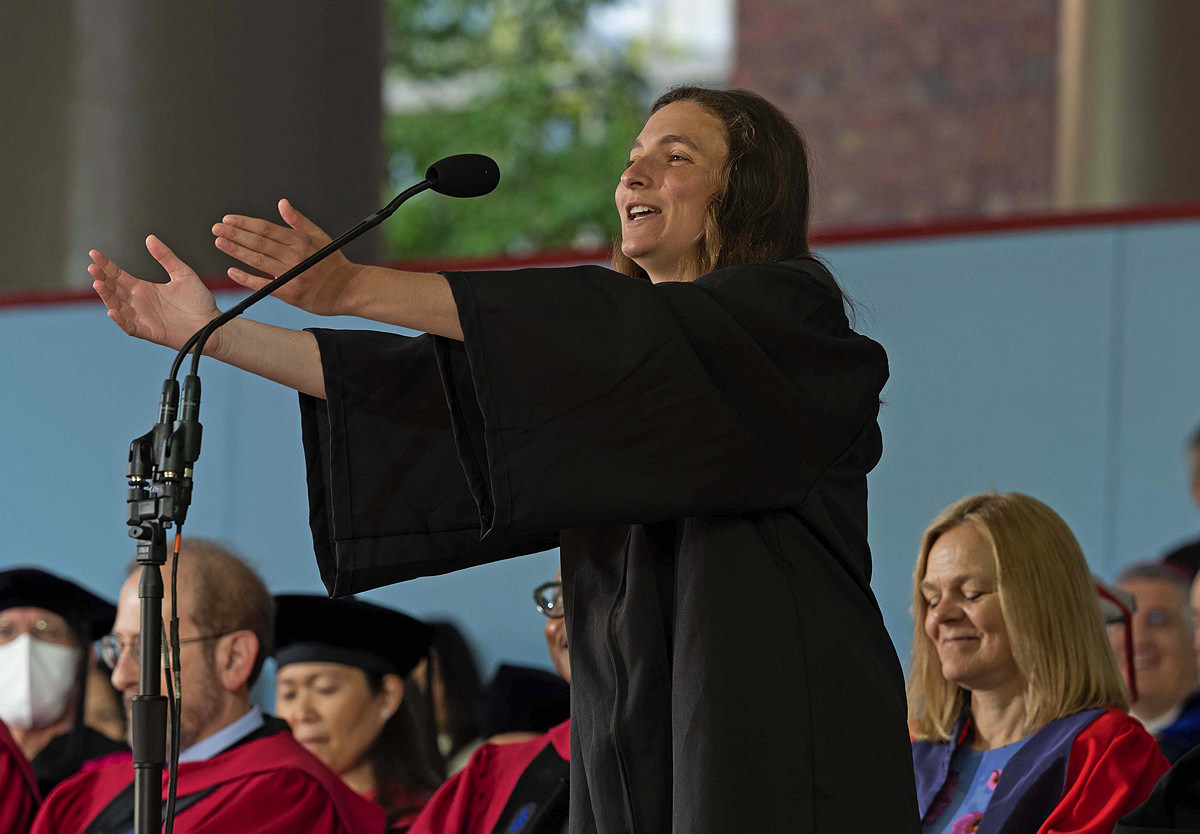
Latin Salutatorian Caroline Engelmayer ’20
Photograph by Jim Harrison
In the online 2020 degree-conferral, Michael J. Phillips ’20 and Sana Raoof ’12, Ph.D. ’18, M.D. ’20, delivered the undergraduate and graduate English orations, respectively (as reported here)—speaking to the camera, of course, and not to 32,000 people seated before them. But Latin Salutatorian Caroline Engelmayer ’20 (who wrote about watching her virtual Commencement) deferred her performance, and so that unfinished bit of collegiate oratory remained. “People’s Zoom stamina was pretty low at that point,” she explained. “It seemed like the Latin one was the natural one to postpone.” Her text, “Iter Perpetuum” (“A Lasting Journey”)—delivered with spirited gesticulations and a huge smile—riffed on classmates’ passage through the College as an updated version of the long travels home of Odysseus. Rather unlike the ancient hero, she observed (in Latin), “Fueled by eagerness, determination, and Red Bull [Tauroque Rubro],” her peers overcame problem sets and other terrors and, as in the mythic land of the Lotus-Eaters, “we, too, discovered a place where anyone who entered lost track of time, half-awake and half-asleep. (I refer, of course, to the third floor of Lamont [id est, contignatio tertia bibliothecae Lamontis].)” Also unlike Greek warriors, she noted, once exiled from campus to Zoom, the members of the classes of 2020 and 2021 assumed a new aspect as “our normal garb gave way to sweatpants”—presumably another of the bonds that tie the classmates together, now that they have returned to the safe harbor of Harvard.
As Engelmayer ended quoting the inscription from Horace on the Class of 1857 gate, the succeeding anthem picked up the theme: “Gates of Harvard Yard,” by Jenny J. Yao ’22, sung at the Baccalaureate on Tuesday (and described here).
And so on to the main formal business of the program: the confirmation of degrees, parallel to the regular form of conferral deployed during the Thursday Commencement proper. The provost and president did the formalities, with deans appearing as summoned, for the Graduate School of Arts and Sciences and University Extension, followed by the most traditional of Harvard Commencement anthems, based on Psalm 78 (St. Martins).
Then it was the graduate and professional schools’ turn. Most deans stuck to the script, but some went off-book to offer their own congratulations: dean of the faculty of medicine George Q. Daley conveyed his “warmest pride” in his son Jack Daley ’20 of Kirkland House before presenting the HMS alumni graduates. Every school cheered as their degrees were confirmed, but the celebrations were relatively subdued until the Harvard Business School cohort kicked things up a notch with hearty cheers. The celebrations grew even louder when President Bacow acknowledged the hard work of professor of business administration Nitin Nohria, who was dean of HBS when these alumni graduates were students, but who stepped down during the pandemic. T.H. Chan School of Public Health graduates built upon the enthusiasm with bright red clappers, while the Graduate School of Education cheered even more vigorously, sans the help of clappers. Harvard Kennedy School graduates celebrated in appropriate fashion, waving blow-up globes.
“Veritas: A Celebration of the Centuries,” by Michael Cheng A.B.-S.M.’19, ’24 J.D., now studying at the Law School, was performed, appearing in the same place as it had in Thursday: right before the College degrees, putting this historic ceremony into a context dating from the seventeenth century (read about the work and composer here).
The outsized College cohort’s celebration of their degree confirmation suggested that maybe they’re not quite as young at heart anymore. Where graduates in past years sometimes get a little too excited, the College alumni graduates appeared to have mellowed with age. They cheered and waved their crimson flags, but no raucous shenanigans ensued.
During the conferral process, members of IBEW Local 103, unionized employees at Harvard School of Medicine, staged a demonstration protesting HMS’s proposed pay cuts for maintenance workers. A plane flew a banner inscribed with the web address, “harvardmedhurtsworkers.org” in circles over Tercentenary Theater for about ten minutes.
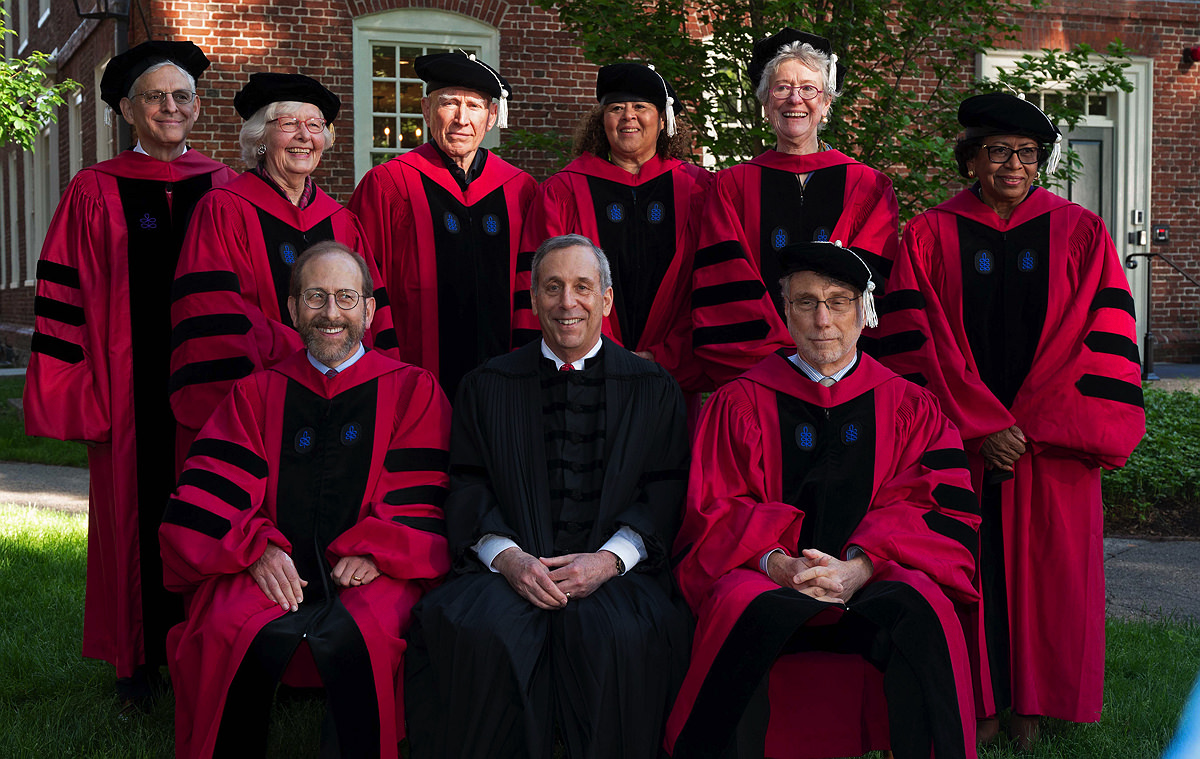
Front row from left: Provost Alan Garber, President Lawrence S. Bacow, Martin Baron. Back row from left: Merrick Garland, Margaret H. Marshall, Sebastião Salgado, Anna Deavere, Arlie R. Hochschild, and Ruth Simmons
Photograph by Jim Harrison
Bacow had a final bit of formal business to conduct: confirming the honorary degrees of those who had received them virtually (an unprecedented break with Harvard tradition, which requires attendance to receive an honorary degree: an impossibility when no one was present on campus). Among those attending were the 2020 guest speaker, Marty Baron (awarded as LL.D. ’21), then executive editor of the Washington Post, and the 2021 speaker, Ruth J. Simmons, Ph.D. ’73, now president of Prairie View A&M, who got her LL.D. the regular way, in 2002. Also recognized were those of the 2021 honorands who could return to campus today, including sociologist Arlie Hochschild, former chief justice of the Massachusetts Supreme Judicial Court Margaret H. Marshall, Ed.M. ’69, Ed ’77, L ’78, photographer Sebastião Salgado, and dramatist and actor Anna Deavere Smith (all described here).
A Coronavirus Catharsis
Then the day’s major surprise—not signaled in the program—was revealed. Backed by a 10-minute slideshow of images of Harvard during the pandemic, and musical accompaniment by violinist Eloise Hodges ’21 [’22], who played selections from Bach and Handel. Members of the classes of 2020 and 2021 read a comprehensive, moving tribute to those who served the community in every conceivable way.
The backdrop was a comprehensive image gallery of the University during a time of inconceivable change—so many masked people; signs warning that libraries and archives were closed; Zoom classes; Harvard Yard banners exhorting everyone, “Let’s Keep Harvard Healthy; Test Yourself Regularly”; PCR test kits, swabs, and collection bins; deliveries of PPE; reopened laboratories and classrooms; vaccination clinics; a masked President Bacow and Adele Bacow assisting during first-year move-in last fall; arriving students undergoing their initial swabbing and testing on the Science Center Plaza; experts like Anthony S. Fauci, S.D. ’09, conferring online with Medical School dean George Q. Daley and the revered Paul Farmer, (Kolokotrones University Professor, whose sudden death in February seemed an especially brutal blow during the pandemic); the safety-conscious Provost Garber, a physician, in hard hat and mask at the groundbreaking for a Harvard-sponsored biomanufacturing facility; the bow-tied Giang Nguyen, whose arrival at University Health Services in late 2019 was just in time for the crisis—and of the numberless staff members who maintained the campus, operated shuttles, supported labs and remote instruction, researched the disease and therapies, and, of course, delivered care in the affiliated hospitals.
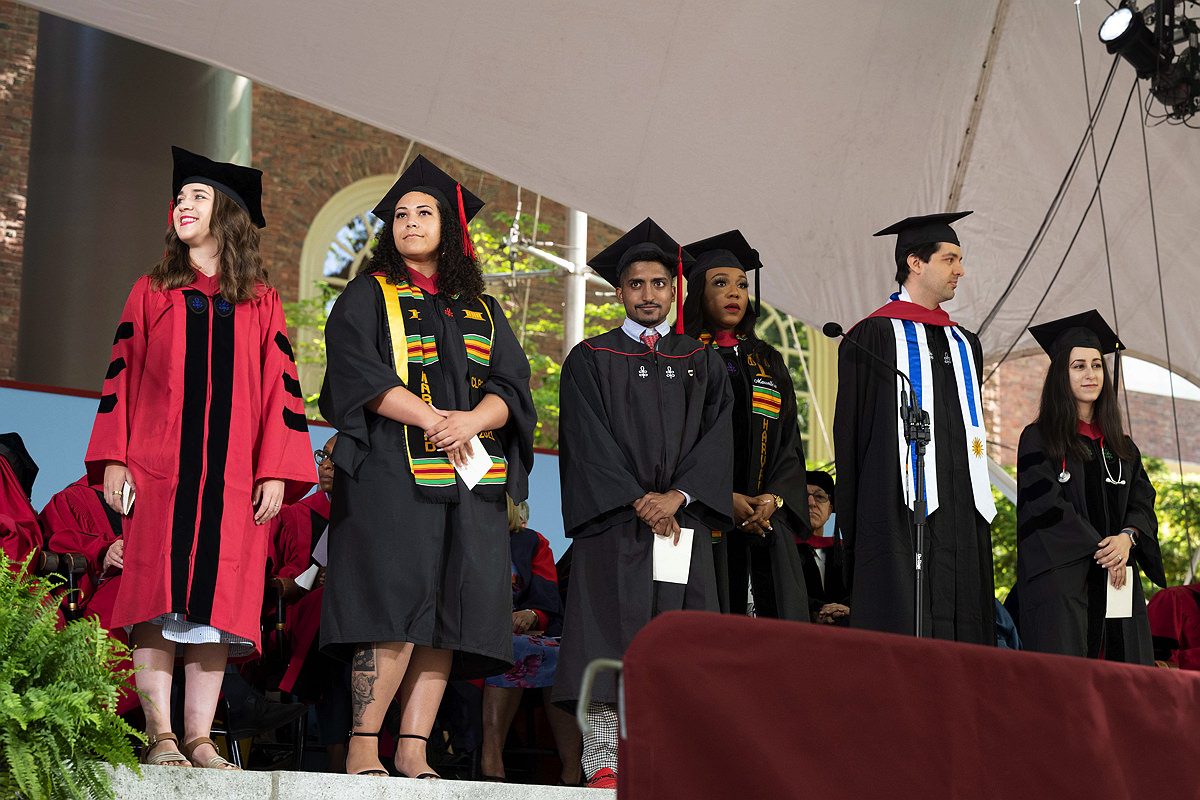
Members of the Class of 2020 and 2021 who were part of the tribute
Photograph by Jim Harrison
The closing image quoted the 2021 online graduation, when a small chorus of Longwood Medical community members, in their white coats and accompanied by a student cellist, sang “The Winter Is Past,” while arrayed, safely distanced, on the Medical School’s front steps. The work, composed by a Brigham and Women’s Hospital emergency medicine physician, was based on the Song of Solomon: “For behold, the winter is past;/the rain is over and gone./The flowers appear upon the earth,/ the time of singing has come.” In the late spring of 2022, that hope now seemed turned into prophecy.
The student speakers’ text singled out, in turn, people who kept things going on campus, people who enabled remote work, people who provided medical/health services, people whose research and service spurred the battle against COVID, faculty in general, staff in general, alumni in general—each entry beginning, “We rise to thank the members” of the named cohort, and ending, “We salute you, and we thank you.”
Inevitable though it now seems, no one could be fully prepared for the emotional power of what followed. A student speaker directed thanks to the loved ones who supported the graduates along the way (with an ad-libbed thanks to her mother):
We rise to thank all of the family members of the Harvard Classes of 2020 and 2021. Without you—shout-out to my mom—we would not be here. And without your extraordinary support over these past two years and more, we would not be able to share in this moment. We love you, and thank you so much.
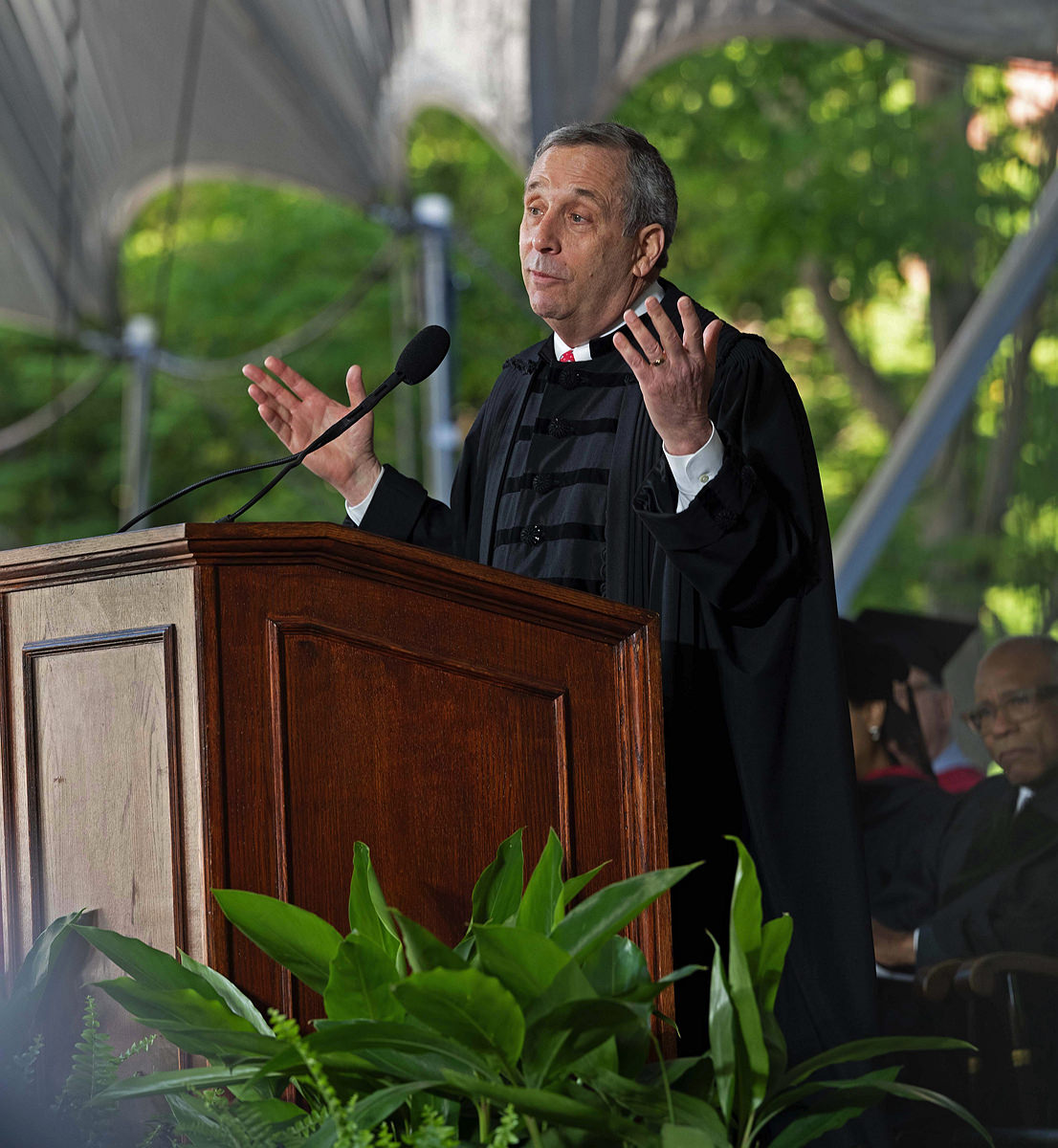
President Lawrence S. Bacow
Photograph by Jim Harrison
Bacow was the last speaker, closing the slideshow with an expression of gratitude to the students themselves:
Finally, I wish to thank all the members of the historic Harvard Classes of 2020 and 2021—the thousands of you here today, and the thousands of you watching from around the world. Your Harvard experience was disrupted by a deadly and daunting pandemic. You had to navigate challenges unlike any faced by your predecessors in decades past. And you did so with resilience and resolve, with creativity and compassion, with grit and with grace. We salute you, we thank you—and we congratulate you all.
The warmth and meaning of the moment could not have been more genuine. The language— “with resilience and resolve, with creativity and compassion, with grit and with grace”—will resonate. And it even seemed that this community—with its structural divisions between administrators and professors, faculty and students, the tenured mandarins and the many staff members who make the place work—having been really sundered by the pandemic, had somehow through that experience been brought together as never before.
The Commencement Address, by The Honorable Merrick Garland
Close observers will note that this year’s guest, Merrick Garland, a double Harvard-degree holder, did not receive the customary honorary degree, perhaps because he felt he should not receive such a thing while holding his current office as U.S. Attorney General.
Garland began his remarks with a brief moment of levity: gazing out at the vast rows of graduates in their black robes, he said, “You look like little judges. I feel right at home.” And he sympathized with the strangeness of the occasion, as thousands of former students returned to campus “not as soon-to-be-graduates anxious about the future, but as actual graduates—anxious about the future.”
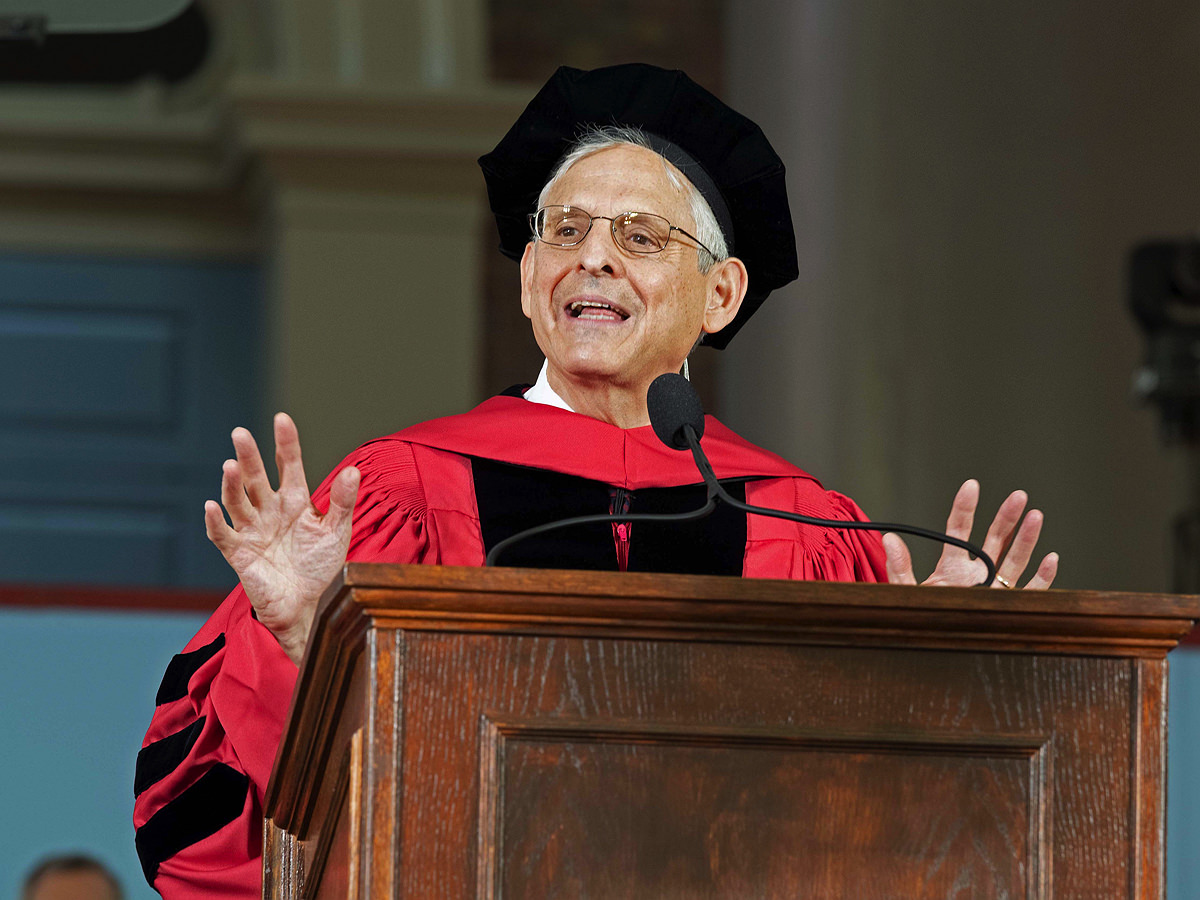
Merrick Garland
Photograph by Jim Harrison
From there, things turned serious, to a discussion of promises and public service and a democracy in peril—“what each of us owes to each other, and…what we all owe as residents of a democracy.” More than once during the 25-minute address, Garland seemed close to tears. He spoke of this week’s school shooting in Uvalde, Texas—“an unspeakable act of violence”—and the “horrific” mass shootings just days earlier in Buffalo, New York, and Laguna Woods, California. “These tragedies,” he said, “only underscore how urgent the call to public service for your generation truly is.”
Speaking to the graduates, but with an eye toward the audience beyond Harvard, Garland said, “Both at home and abroad, we are seeing the many ways in which democracy is under threat.” Russia’s “unprovoked and unjust” invasion of Ukraine “make clear the stake we all have in the success of democracy,” he said. In the United States, he noted recent efforts to undermine the right to vote: the decade of Supreme Court decisions (beginning with Shelby County vs. Holder in 2013) that have weakened the Voting Rights Act, and the wave of subsequent legislation that makes it harder for eligible citizens to vote. “And there may be worse to come,” Garland warned. “Some have even suggested giving state legislatures the power to set aside the choice of the voters themselves. That is not the way a representative democracy is supposed to work.”
He promised to push back against such efforts. At the Justice Department, he said, “We will continue to use every tool we have left to protect the right to vote. At the same time, we will continue to ask Congress to pass legislation that every eligible voter can cast a vote that counts.”
Equally dangerous as voter suppression, he said, is the rise in violence and threats of violence across the country. He spoke again about the massacre in Buffalo, where 10 black people were killed and three others wounded: “The Justice Department is investigating that act as a hate crime and an act of racially motivated violent extremism. And he also pointed to the threats and violence directed at public health officials, medical professionals, election officials, elected office-holders, journalists, and educators—amid policy debates during the past few years over issues like public safety, the pandemic, and school curricula. “These threats and acts of violence are permeating so many parts of our national life that they are becoming normalized and routine,” Garland said. “This is deeply dangerous for our democracy.”
Later, he promised that the Justice Department is “doing everything within our power to stop the hate crimes that terrorize entire communities.” And: “We will hold accountable those who direct violence and illegal threats of violence against those who serve the public.”
He also condemned the insurrection and attack on the U.S. Capitol on January 6, 2021, and emphasized the Justice Department’s responsibility to hold accountable the perpetrators of that day. “We are undertaking one of the largest investigations in our history to hold accountable everyone who was criminally responsible for the January 6 assault on our democracy,” Garland said. “We will follow the facts wherever they lead.” So far, at least 846 people have been arrested and charged with crimes.
Garland laid out for the graduates a number of steps they must take to protect American democracy: participate in community service, take care in how they treat others, work to dissipate the hatred that fuels violence, respect the rule of law—and tell the truth. “Together, we must ensure that the magnitude of an event like January 6th is not downplayed or understated,” he said. “The commitment to the peaceful transfer of power must be respected by every American. Our democracy depends on it.”
Early in his speech, Garland had recounted his own call toward public service, which he first imagined would be a career in medicine—“because I saw it as the best way to help people directly”—until chemistry proved too tough. He also recounted, in a voice thick with emotion, his family’s escape from the Holocaust: his grandmother was one of four Jewish siblings from Belarus who sought refuge from religious persecution before World War I. Three made it to the United States; the fourth was turned away at Ellis Island, and a fifth sibling decided not to come. The two who stayed behind died in the Holocaust. “For me, public service is a way to repay the debt my family owes this country for our very lives.”
He urged the graduates toward similar commitments, in civil service, military service, elected office, nongovernmental organizations, teaching, or volunteering. “Don’t let your generation be defined by the pandemic. Let it be defined by public service.”
At the end of his speech, he returned to that theme, quoting the late civil rights leader and U.S. Congressman John Lewis, LL.D. ’12. In an editorial published shortly before his death in 2019, Lewis, Garland said, “recalled an important lesson taught by Martin Luther King: ‘Democracy is not a state….It is an act. And each generation must do its part.’” Looking up at the graduates, Garland said, “Now you are that generation.”
After Garland’s final admonishment for the graduates to put their degrees to good use “after a raucous—but of course legal—celebration,” all that remained was the singing of “Fair Harvard” and the benediction by Matthew I. Potts, Pusey Minister in the Memorial Church and Plummer professor of Christian morals. New to his position, Potts got two rounds of experience sending a crowd of tens of thousands off on a high note within just three days. Usually, Potts noted, a benediction is “a way of saying goodbye,” but the classes of 2020 and 2021 “have already taken your leave of this place. We blessed you then, on YouTube,” he said, (to laughter from the assembly). So he offered instead a “validation” of who the graduates were, are, and will be: “This upturned world stands in utter need of change, which means this world needs people who can engage transformation with grit and grace….Return to the futures you have already begun. Enjoy every blessing this day and always and become for our world the blessing you have already been to us.” After that, the Middlesex sheriff administered the formal adjournment and the band struck up its marching music as the bells sounded.
And then it was off to Houses and schools for formal confirmation of individual degrees, socializing, celebrating, and just easing into a satisfactory conclusion to a Harvard education. With the Thursday hoopla and now this second full-scale Commencement-related gathering, and the initial Harvard Alumni Day on deck for June 3, it was a tough spring to be a blade of grass in Tercentenary Theatre—but a great time for three classes of young scholars to be properly recognized as members of the community of Harvard graduates, memorably, and at long last.
